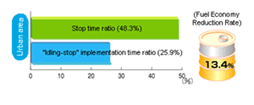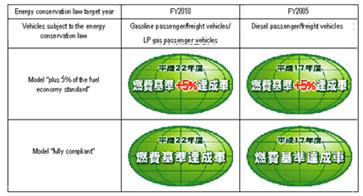Promotion of Cars with the gIdling-Stoph System
- Idle-free driving can improve fuel economy by approximately 10%.
An even greater energy conservation effect is expected in urban areas, where car stopping frequency is high. - Partial subsidy for the purchase of cars equipped with the gidling-stoph system was introduced in FY2003.
- Promotional campaigns for gidling-stoph systems are held in the form of PR events, etc.
| Result of the driving experiments by gidling-stoph cars | PR activities |
| Results of "The Idling-Stop 2002 Caravan Throughout Japan" Nationwide (3719km)...5.8% on averageOr 13.4% in city areas [Stop & “idling-stop” implementation time ratio in urban area] |
An event for gidling-stop-at-stoplighth experiments is scheduled for October 2005 Idling-free promotional event (Osaka) |
 |
 |
| Idling-free promotional event (Osaka) |
